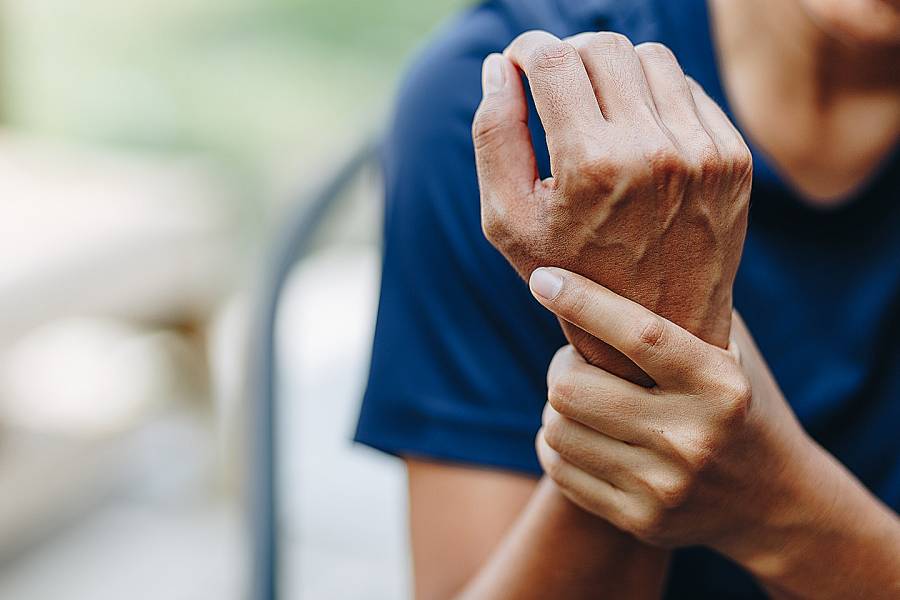This is the ninth in a series of stories about how you can use the myStrength wellness portal and app to enhance your emotional well-being. In this installment, Anthony Meek, an employee assistance specialist, addresses chronic pain and mental health.
There is a strong relationship between emotional and physical health. Oftentimes, individuals do not recognize the impact that physical health has on the mind and how pain can negatively affect mood and increase stress levels. Physical activity and maintaining good physical health are key components to coping with stress, and chronic pain can interfere with your ability to take care of yourself. Chronic pain can alter your lifestyle and inhibit social activity and emotional connections.
Pain itself is a useful biological function. It sends signals and alerts the brain that there is a threat and that the body is potentially in danger. Our brains then warn our bodies and allow us to avoid situations or keep ourselves from overexerting and causing harm. However, the body is not designed to constantly send those messages of pain to the brain, and over time the pathways can be damaged and can lead to interpreting pain that is not real or fear of injury and avoiding normal behaviors.
There is a difference between chronic pain and acute pain. Acute pain, which can be momentary or last up to three months, is treatable. Chronic pain lasts longer than three months, and the impact can be lifelong. Chronic pain can change the way that someone moves through the world, and it is common for it to be accompanied by depression, anxiety, or other mental health issues.
Chronic pain can alter the way that someone thinks and can lead to feelings of sadness, frustration, and hopelessness. It also can cause individuals to be hesitant to do work or engage in their favorite leisure activities for fear of exacerbating their pain or causing another injury.
One concept of managing pain is the gate control theory, which states that the body can stop pain signals from reaching the brain by activating other nerves that do not transmit pain signals. By activating other nerves using sensory techniques such as mindfulness meditation and massage, as well as cognitive techniques such as distraction and engaging with other tasks or outside interests, one can better control the experience of pain and have improved emotional outcomes.
Chronic pain is more effectively treated by using coping strategies and techniques to manage the three types of pain that come up throughout the process. They are:
- Emotional pain: anger, frustration, anxiety, depression, grief
- Social pain: lifestyle impact, relationship issues, inactivity, changes in employment, isolation
- Spiritual pain: religious doubt, lack of inspiration, questioning meaning and purpose, loss of connection
When managing pain, it is important to set meaningful goals that are fulfilling. Because of the untreatable nature of chronic pain, setting goals of "zero" pain or a return to one's previous lifestyle may be unattainable and therefore discouraging. However, goals that focus on ways of improving life while managing pain inspire more action and give an individual a sense of purpose and focus on what they can do compared to what they cannot. Setting meaningful goals creates a better sense of control over the pain and leads to better physical and emotional outcomes.
A helpful resource is the myStrength app that is available to Johns Hopkins employees and their family members. It provides information and education about chronic pain and how it affects individuals as well as strategies to manage pain and develop plans for improving quality of life. It can be downloaded from the Apple App Store or Google Play. To create an account, use your email address and the access code JHU or JHHS, depending on your affiliation.
The app is customizable and has modules on a variety of self-care strategies for issues such as depression, anxiety, stress, sleep hygiene, alcohol and drug use, impact of COVID-19, and more. myStrength is self-paced, and exercises can be done when convenient and in the comfort of your own home.
For additional support, Johns Hopkins mySupport is available to assist employees and their family members with a wide range of issues, including any concerns or questions you may have. You can contact mySupport at 443-997-7000.
Posted in Health+Well-Being
Tagged hr newswire








